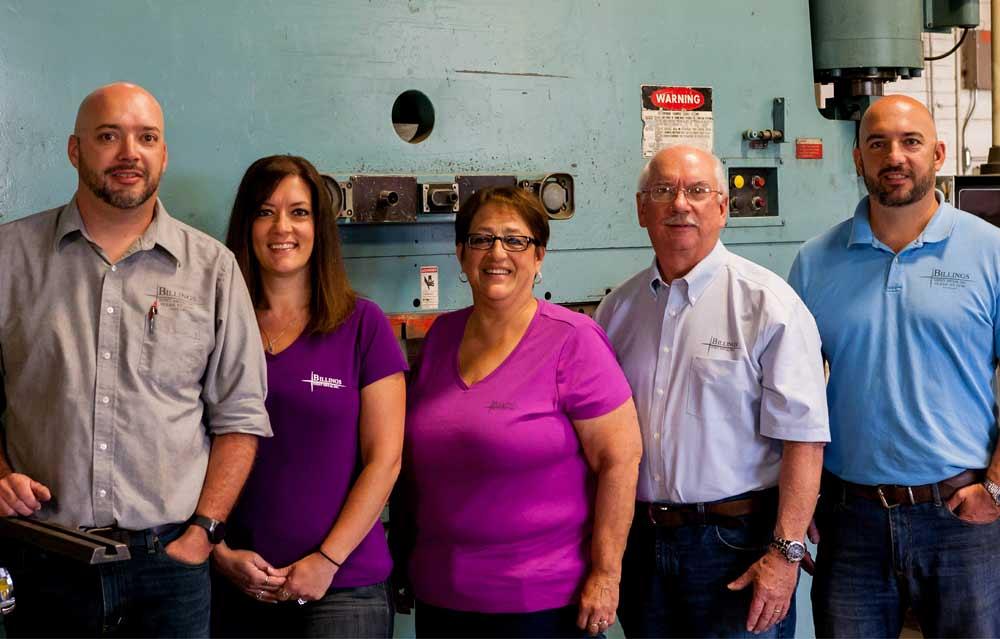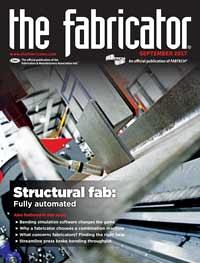Senior Editor
- FMA
- The Fabricator
- FABTECH
- Canadian Metalworking
Categories
- Additive Manufacturing
- Aluminum Welding
- Arc Welding
- Assembly and Joining
- Automation and Robotics
- Bending and Forming
- Consumables
- Cutting and Weld Prep
- Electric Vehicles
- En Español
- Finishing
- Hydroforming
- Laser Cutting
- Laser Welding
- Machining
- Manufacturing Software
- Materials Handling
- Metals/Materials
- Oxyfuel Cutting
- Plasma Cutting
- Power Tools
- Punching and Other Holemaking
- Roll Forming
- Safety
- Sawing
- Shearing
- Shop Management
- Testing and Measuring
- Tube and Pipe Fabrication
- Tube and Pipe Production
- Waterjet Cutting
Industry Directory
Webcasts
Podcasts
FAB 40
Advertise
Subscribe
Account Login
Search
What makes a custom fabricator unique?
It’s the people
- By Tim Heston
- September 15, 2017
- Article
- Shop Management

The family of Billings Sheet Metal, from left, Jason Billings, project manager (son); Jill Stady, project assistant/marketing (daughter); Debbie Billings, co-owner and secretary/treasurer (mother); Jim Billings, owner (father); and Jeff Billings, project manager/estimator (son).
“Why do customers buy from us—really?” The answer defines a company’s brand and the foundation of its marketing. It’s a tough question to answer for any business, and it can be even tougher in custom fabrication.
Besides price, what really sets a fabricator apart? The company doesn’t have a product that exemplifies its brand. It has a service that can change from one job to the next. For one customer, a shop manages a complicated project, designing it from the ground up. For another customer, a fabricator makes a part to print.
From a cash flow perspective, a fabricator wants both. The large project offers greater profit but, with a long order-to-cash cycle, can hurt cash flow. A repeatedly ordered quick-turn job may have razor-thin margins, but the extremely short order-to-cash cycle improves cash flow. And those who can master the work flow of such a diverse mix of jobs are in pretty good shape. But from a branding perspective, the mix of work presents a challenge.
Everyone says, “We strive to deliver quality work on time, every time.”
Everyone touts great service, and everyone says they bend over backward for customers. But these attributes have become the ticket to entry, especially in some of the more competitive fabrication markets in certain areas of the country. They don’t really set a shop apart.
Could the mix of machinery be a factor? I’ve spoken with investors who have told me that a unique capability mix is becoming increasingly important in the mergers and acquisitions arena. The fabricator doesn’t have a proprietary product line or proprietary machines, but it can have a unique, or at least unusual, mix of manufacturing machines and (ideally) expertise.
But even this isn’t impossible for a competitor to copy. And does bringing more processes in-house improve a fabricator’s competitive position? The answer isn’t clear-cut, and it depends on relationships with outside suppliers, a fabricator’s core competencies, the markets the fabricator serves, and more. A certain combination of processes may bring more customers into the fold, but is it a fabricator’s brand?
Even continuous improvement processes don’t make a fabricator entirely unique. The tools of lean manufacturing and other continuous improvement methods are widely published and available to any company willing to make the investment.
Is a custom fabricator just a collection of metal fabrication technology and processes, and nothing more? Of course not. So again, what is a fabricator’s brand?
During a conversation with Jill Stady of Billings Sheet Metal in Olean, N.Y., it dawned on me that marketing in sheet metal fabrication has less to do with processes and technology, which can be copied, and more to do with the people. In both the real and metaphorical sense, the people in much of metal fabrication are like family.
Half of those at Billings Sheet Metal are family in the literal sense. Stady is the daughter of Jim and Debbie Billings, who launched the company in 1989. Today the five people in the front office are all family members.
The shop launched as a roofing and HVAC company, running out of a small building in Olean, N.Y., in western New York. Local work, including railings and ductwork for various commercial facilities, helped the company grow, and regional work helped the company grow larger.
Stady said that she hopes that national work will help the company grow to the next level.
She cited industrial parts washers Billings fabricated for a Canadian company that was looking to sell its product to government entities in the U.S., including the Bay Area Transportation Authority in San Francisco. The Montreal-based company isn’t far from Olean, and Olean had easy highway access for shipping, be it to California, New York City, or anywhere else. Trade agreements require certain government agencies to buy products made in America, and for the Montreal-based parts washer company, Billings Sheet Metal fit the bill.
“It’s a Canadian design and a Canadian company, but it employs a U.S. workforce, and the products were made with U.S.-made material,” Stady said. “And they were made in our small town, and we packaged and shipped them to San Francisco.”
She added that the customer chose Billings also because it’s a small company, with just 11 employees total, where there’s less bureaucracy and it’s easier to talk to someone who can help.
It really is about finding people who can help. Many in corporate America say “our people set us apart,” but it seems more real in custom fabrication, and fabricators have specific stories to help prove the point.
These stories are more concrete than just the difficult-to-define task of “building relationships.” They’re about how a company treats its employees and how those employees relate to one another and customers.
Say a potential customer visits a fab shop and sees a parking lot full of old, junky cars surrounding some shiny new ones near the front (the executive suite). He walks into a shop full of welding fume, supervisors barking orders, and personnel being constantly monitored and micromanaged.
That customer then drives to a competing fabricator’s parking lot. The cars aren’t old. The shop is clean, clear of welding fume. The customer sees people talking, collaborating. They’re all helping to move projects through the system.
They’re like family; and quite often, many of them literally are. Sometimes the family isn’t functional, particularly if a shop owner institutes significant change. I’ve talked to several shop managers over the years about difficult changes regarding longtime colleagues who couldn’t adapt. Letting them go was tough; they were like family.
This isn’t limited to small shops either. I’ve visited large fabricators that had the structure in place—strong management, training, ability for front-line people to voice opinions and make a difference—that made the place feel like a family. The family had several hundred members, but it felt like family all the same.
That literal or metaphorical family is a custom fabricator’s marketing message. The story of human interaction—between customer, fab shop manager, welder, press brake operator, and others—is truly what sets a fabricator apart from the pack.
Photo courtesy of Billings Sheet Metal Inc., 716-372-6165, www.billings-fabrication-services.com.
About the Author

Tim Heston
2135 Point Blvd
Elgin, IL 60123
815-381-1314
Tim Heston, The Fabricator's senior editor, has covered the metal fabrication industry since 1998, starting his career at the American Welding Society's Welding Journal. Since then he has covered the full range of metal fabrication processes, from stamping, bending, and cutting to grinding and polishing. He joined The Fabricator's staff in October 2007.
subscribe now

The Fabricator is North America's leading magazine for the metal forming and fabricating industry. The magazine delivers the news, technical articles, and case histories that enable fabricators to do their jobs more efficiently. The Fabricator has served the industry since 1970.
start your free subscription- Stay connected from anywhere

Easily access valuable industry resources now with full access to the digital edition of The Fabricator.

Easily access valuable industry resources now with full access to the digital edition of The Welder.

Easily access valuable industry resources now with full access to the digital edition of The Tube and Pipe Journal.
- Podcasting
- Podcast:
- The Fabricator Podcast
- Published:
- 04/16/2024
- Running Time:
- 63:29
In this episode of The Fabricator Podcast, Caleb Chamberlain, co-founder and CEO of OSH Cut, discusses his company’s...
- Trending Articles
AI, machine learning, and the future of metal fabrication

Employee ownership: The best way to ensure engagement

Steel industry reacts to Nucor’s new weekly published HRC price

How to set a press brake backgauge manually

Capturing, recording equipment inspection data for FMEA

- Industry Events
16th Annual Safety Conference
- April 30 - May 1, 2024
- Elgin,
Pipe and Tube Conference
- May 21 - 22, 2024
- Omaha, NE
World-Class Roll Forming Workshop
- June 5 - 6, 2024
- Louisville, KY
Advanced Laser Application Workshop
- June 25 - 27, 2024
- Novi, MI


























